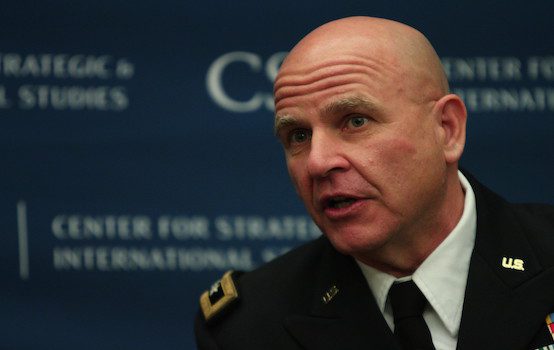McMaster Uses Worn Vietnam Trope to Accuse Americans of Defeatism

Former national security advisor H.R. McMaster lamented the lack of public support for the war in Afghanistan last week. The American public, he complained, has succumbed to “this defeatist narrative” of “war weariness.”
This view, which evokes a familiar Vietnam War trope, is common among the foreign policy establishment in Washington, which sees the voting public as children and itself as the “adults in the room.” The way they see it, they’re there to make the hard decisions on war and peace for a population that just doesn’t understand.
Nothing could be further from the truth. McMaster’s speech laid bare Washington’s ignorance of what’s at stake: it’s up to the people, not a few so-called elites, to decide which wars are worth fighting. And after almost two decades in which no war has ended on terms beneficial to America—or ended at all—it is clearly the war-weary people, and not the elites, who understand the situation better.
After leaving the White House, McMaster became chairman of the new Center on Military and Political Power at the Foundation for Defense of Democracies. FDD is a Washington-based neoconservative outfit that’s been promoting U.S. wars of choice since the Iraq invasion in 2003.
One might say it’s McMaster’s job now to ensure that the United States maintain its military investment in Afghanistan. His recent remarks before a think tank forum, which included the comments above, certainly don’t suggest otherwise.
But since it effectively achieved all of President George W. Bush’s initial operational objectives by early 2002, the war in Afghanistan has descended into an open-ended, losing debacle with no sign of stopping. The war in Iraq resulted in a corrupt government that can’t secure itself without U.S. military support and that’s heavily influenced by Iran. The 2011 regime change operation in Libya sparked a civil war that has raged for almost eight years.
Added to these major conflicts are permanently open-ended fights in Pakistan, Syria, Yemen, Somalia, and Niger, plus scores of other active military operations elsewhere in Africa. Not one of these wars has so much as a quantifiable set of objectives whose accomplishment would signal a successful conclusion. Each and every one is to be conducted for its own sake, forever. Few of them have so much as a tangential security benefit for our country; many have no relation to U.S. security at all.
Establishment Washington claims to have the education, understanding, and firsthand experience to know what’s in America’s best interests abroad. Their record says otherwise. It is no small irony that the architects of almost 20 years of failed wars are the ones now belittling the American public for succumbing to “war weariness.”
This disconnect between the will of the people and the desires of the elite is, in large part, the reason the Constitution placed the power for declaring wars in the hands of Congress. In 1793, James Madison, the author of the Constitution, explained why he designated Congress, and not the president, as the sole decider on matters of war and peace. “In no part of the Constitution is more wisdom to be found than in the clause which confides the question of war or peace to the legislature, and not to the executive department,” he wrote. The strongest passions and greatest weaknesses of man—“ambition, avarice, vanity, the…love of fame, are all in conspiracy against the desire and duty of peace.” Over time, however, a series of strong chief executives and weak Congresses have eroded the Article I war-making powers, resulting in the unaccountable military actions of recent history.
In 1973, Congress attempted to reclaim some control over the president’s war-making abilities via passage of the War Powers Act (WPA). The results were limited. President Ronald Reagan challenged Congress’s authority by authorizing low-level military support to El Salvador in 1981 and paramilitary operations to help overthrow the government of Nicaragua beginning in 1983. In both instances, members of the House and Senate sued the president for violating the WPA. They lost.
President George H.W. Bush did obtain congressional approval for 1991’s Operation Desert Storm, but he planned to attack even without it. “They can file impeachment papers if they want to,” he wrote in his diary prior to the vote. A few years later, President Bill Clinton overtly claimed he didn’t need congressional approval to fight an air war against Serbia.
Congress gave President George W. Bush authorizations for the use of military force (AUMFs) to begin the wars in Afghanistan and Iraq in 2001 and 2002, respectively. But Bush expanded the missions with impunity thereafter, claiming 18 times that those AUMFs covered his new operations. Congress never challenged him.
President Barack Obama continued the trend, refusing to ask Congress’s permission for a wide assortment of military operations abroad, most infamously the 2011 disaster in Libya.
Now, President Donald Trump has taken the prerogative even further, claiming virtual independence from Congress’s authority. He has already twice attacked targets in a sovereign country without congressional approval and is currently threatening military action against Iran and Venezuela—again without any green light from Congress.
If a president can’t muster support from the legislature and the public for a proposed conflict, that’s a pretty good indicator that the matter doesn’t merit using lethal force. If American security is actually at risk, the people will easily back defensive military action. It is, after all, our money that will be spent and our sons and daughters who will fight and die. Is it too much to ask that Washington to follow the Constitution and respect the public will?
Daniel L. Davis is a senior fellow at Defense Priorities and a former lieutenant colonel in the U.S. Army who retired in 2015 after 21 years, including four combat deployments. Follow him @DanielLDavis1.